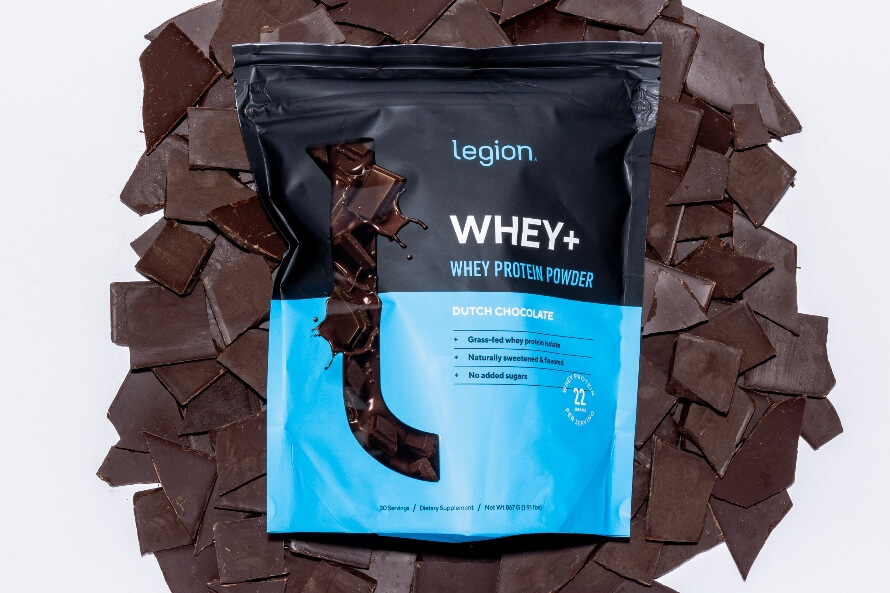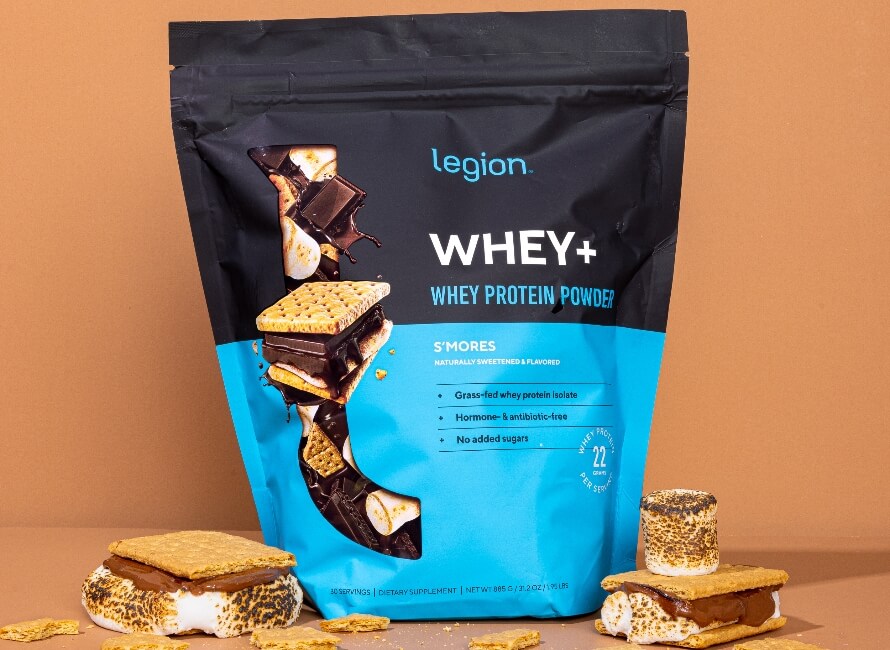When a whey protein powder claims to be “grass-fed,” most consumers assume it comes from cows roaming pastures, eating only grass, and cared for by principled farmers.
It’s a reassuring claim—and one that sells a lot of protein.
But how much of that picture is real? And what does “grass-fed” really mean when it comes to whey protein?
Let’s take a closer look.
Key Takeaways
- “Grass-fed” isn’t a regulated term, which means companies can use it even if cows eat significant amounts of grain.
- Many supplement brands still use the claim without offering proof that their grass-fed whey protein is what they say—no sourcing details, no third-party certification, not even basic info about feed or pasture time.
- The best way to verify a product is truly grass-fed is to look for certifications like Truly Grass Fed™, AGW, AGA, or Pasture for Life.
- Milk from grass-fed cows contains more omega-3s, CLA, and fat-soluble vitamins. But since most whey protein powders contain very little fat, you don’t get enough of these compounds to meaningfully affect your health.
- The bigger benefit is quality. Certified grass-fed whey protein typically comes from cleaner supply chains, better farms, and higher-quality milk.
- If you want a naturally sweetened and flavored whey protein isolate powder made with antibiotic- and hormone-free Truly Grass Fed™ milk from small dairy farms in Ireland, try Whey+.
Table of Contents
+
The Promise of Grass-Fed Whey Protein Powder

When a whey protein powder claims to be “grass-fed,” most people assume it comes from cows raised on open pastures, eating only grass—as nature intended.
For many, it may also imply that it came from small, environmentally friendly farms where ethical farmers uphold the highest animal welfare standards.
And because we tend to associate “natural” with “better,” many people also assume grass-fed whey is healthier, higher quality, and more effective than regular whey.
The Reality of Grass-Fed Whey Protein Powder
Despite sounding specific, there’s no legal definition for “grass-fed” dairy in the U.S. The FDA doesn’t regulate the term, which means companies can interpret it however they like.
In other words, a cow could spend most of its life eating grain, nibble on some grass now and then, and still produce milk used in a “grass-fed” whey protein product. And because the supplement industry is a wretched hive of scum and villainy, that same milk may even be used in a “100% grass-fed” whey protein powder.
The problem isn’t unique to the U.S., either.
In New Zealand—a country that markets itself as the grass-fed dairy capital of the world—the leading dairy co-op used the label “100% grass-fed” while allowing cows to get up to 20% of their diet from grain or supplemental feed. It only dropped the claim after Greenpeace took legal action against the inaccuracy.
Despite that high-profile case, the pattern continues.
Many leading supplement companies still claim “grass-fed” without offering sourcing details, third-party certification, or even basic information about how often cows are on pasture or how much grain they’re fed.
In cases like these, your only option is to trust them. And that’s not easy in an industry known for misleading marketing claims.
What to Look Out for When Buying “Grass-Fed” Products

If you want to be sure your whey protein really comes from grass-fed cows, look for a third-party certification. Here are some of the most credible programs:
- Truly Grass Fed™ (Ireland): This is one of the few certifications commonly used in whey protein. It requires that at least 95% of a cow’s diet comes from grass and that cows spend at least 250 days per year on pasture. Compliance is verified through regular, independent audits.
- Certified Grassfed by AGW (A Greener World): This applies to both meat and dairy and sets strict standards for a 100% grass-fed diet, pasture-based living, and full traceability through the supply chain. Farms are inspected by a third party to ensure compliance.
- American Grassfed Association (AGA): A US-based program that requires animals to be raised entirely on pasture, never fed grain, and never treated with hormones or unnecessary antibiotics.
- Pasture for Life (UK): This certification covers livestock fed entirely on pasture with no grain supplementation.
If a brand isn’t using one of these certifications—and doesn’t offer clear details about where their whey comes from or how the cows were raised—it’s sensible to be skeptical of any “grass-fed” claims.
What Are the Benefits of Grass-Fed Whey Protein Powder?
Many people choose grass-fed whey protein powder assuming it’s healthier than regular whey. This is likely true—but not for the reasons most expect.
Milk from grass-fed cows tends to contain more omega-3 fatty acids, conjugated linoleic acid (CLA), and fat-soluble vitamins like A and E. That’s because cows that graze on pasture produce a different kind of milk than cows raised on grain-heavy diets.
But since most whey protein powders—especially isolates—contain very little fat, the direct nutritional benefits of grass-fed whey protein are relatively small. You might get trace amounts of these compounds, but not enough to meaningfully benefit your health.
Where grass-fed whey protein powder tends to stand out is in its sourcing.
Certified programs typically require cows to spend more time on pasture, eat a more natural diet, and live in less industrial conditions. That often leads to better animal welfare, more responsible farming, and higher-quality milk overall.
Ireland is a good example. Its dairy farms are known for their pasture-based practices and sustainable production. Multiple studies have found that Irish milk is among the cleanest and most nutrient-rich in the world—making it an excellent raw material for whey.
There’s also the matter of quality control. Certified grass-fed protein powder is more likely to come from transparent supply chains and brands that invest in rigorous sourcing, testing, and manufacturing standards.
That can make a real difference in terms of traceability and overall product quality—factors that matter, even if they don’t appear on the label.
The Best Grass-Fed Whey Protein Powder

If you want a naturally sweetened and flavored whey protein isolate powder made with antibiotic- and hormone-free Truly Grass Fed™ milk from small dairy farms in Ireland, try Whey+.
What’s more, Whey+ comes from farms certified by Ireland’s Sustainable Dairy Assurance Scheme, which ensures the farmers adhere to best practices in animal welfare, sustainability, product quality, traceability, and soil and grass management.
It’s also naturally sweetened and flavored with no artificial sweeteners, flavors, food dyes, fillers, or other unnecessary junk. And it’s tested for purity and potency in an ISO 17025-accredited third-party lab and independently certified by Labdoor™ to contain no contaminants or banned substances.
FAQ #1: What is “grass-fed whey” protein powder?
Grass-fed whey protein powder is made from the milk of cows that eat mostly grass. The idea is that these cows are raised on pasture instead of being confined and fed a grain-heavy diet.
But the term “grass-fed” isn’t regulated in the U.S., so brands can use it even if the cows eat significant amounts of grain. That’s why it’s important to look for third-party certifications like Truly Grass Fed™—they set real standards for pasture time and diet, and verify them through independent audits.
FAQ #2: Is grass-fed whey protein better than regular whey?
It depends on what you mean by “better.”
Nutritionally, grass-fed milk contains more omega-3s, CLA, and fat-soluble vitamins—but since most whey protein powders have very little fat, you won’t get much of those benefits in practice.
The real difference is where the milk comes from. Certified grass-fed whey protein typically comes from farms with better animal welfare, more natural feeding practices, and cleaner supply chains.
That can mean higher-quality milk and more rigorous testing, which some people prefer even if the nutrition is similar.
READ MORE: The Definitive Guide to Whey Protein
FAQ #3: Is grass-fed whey protein good for you?
Yes—whey protein in general is a high-quality, easily digested source of complete protein that supports muscle growth and overall health.
READ MORE: The Top 4 Scientifically Proven Benefits of a High-Protein Diet
Scientific References +
- Li, Meng, and Gretchen B. Chapman. “Why Do People like Natural? Instrumental and Ideational Bases for the Naturalness Preference.” Journal of Applied Social Psychology, vol. 42, no. 12, 24 Oct. 2012, pp. 2859–2878, https://doi.org/10.1111/j.1559-1816.2012.00964.x.
- Dhiman, T.R., et al. “Conjugated Linoleic Acid Content of Milk from Cows Fed Different Diets.” Journal of Dairy Science, vol. 82, no. 10, Oct. 1999, pp. 2146–2156, https://doi.org/10.3168/jds.s0022-0302(99)75458-5. Accessed 17 Dec. 2019.
- Terra, Stefania La, et al. “Increasing Pasture Intakes Enhances Polyunsaturated Fatty Acids and Lipophilic Antioxidants in Plasma and Milk of Dairy Cows Fed Total Mix Ration.” Dairy Science and Technology, vol. 90, no. 6, 2 Sept. 2010, pp. 687–698, https://doi.org/10.1051/dst/2010100. Accessed 28 May 2025.
- Lindmark Månsson, Helena. “Fatty Acids in Bovine Milk Fat.” Food & Nutrition Research, vol. 52, no. 1, Jan. 2008, p. 1821, https://doi.org/10.3402/fnr.v52i0.1821.
- More, SJ. “Global Trends in Milk Quality: Implications for the Irish Dairy Industry.” Irish Veterinary Journal, vol. 62, no. S4, 1 Apr. 2009, www.ncbi.nlm.nih.gov/pmc/articles/PMC3339351/, https://doi.org/10.1186/2046-0481-62-s4-s5.
- Archer, Simon C., et al. “Association of Season and Herd Size with Somatic Cell Count for Cows in Irish, English, and Welsh Dairy Herds.” The Veterinary Journal, vol. 196, no. 3, June 2013, pp. 515–521, https://doi.org/10.1016/j.tvjl.2012.12.004. Accessed 15 Nov. 2022.
- O’Brien, B., et al. “Irish Research Response to Dairy Quality in an Era of Change.” Irish Journal of Agricultural and Food Research, 26 Feb. 2022, https://doi.org/10.15212/ijafr-2020-0142.
- Roisin O'Sullivan, et al. “Stable Isotope Profile (C, N, O, S) of Irish Raw Milk: Baseline Data for Authentication.” Food Control, vol. 121, 21 Sept. 2020, pp. 107643–107643, https://doi.org/10.1016/j.foodcont.2020.107643. Accessed 1 Oct. 2024.
- Morton, Robert W, et al. “A Systematic Review, Meta-Analysis and Meta-Regression of the Effect of Protein Supplementation on Resistance Training-Induced Gains in Muscle Mass and Strength in Healthy Adults.” British Journal of Sports Medicine, vol. 52, no. 6, 11 July 2017, pp. 376–384, https://doi.org/10.1136/bjsports-2017-097608.
- Konstantinos Prokopidis, et al. “The Effects of Whey Protein Supplementation on Indices of Cardiometabolic Health: A Systematic Review and Meta-Analysis of Randomized Controlled Trials.” Clinical Nutrition, vol. 44, 7 Dec. 2024, pp. 109–121, www.clinicalnutritionjournal.com/article/S0261-5614(24)00444-8/fulltext, https://doi.org/10.1016/j.clnu.2024.12.003. Accessed 11 Feb. 2025.










